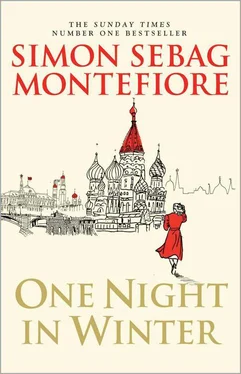Now, sweltering in the heat of the red-walled house in Samarkand, he replayed the course of their affair. He told himself he was lucky to have made love to such a woman. ‘You’re so blessed to love and to be loved,’ he said aloud to himself. Then he remembered how once, when he’d reassured her that her figure wasn’t too curvaceous, she had replied curtly, ‘But you would say that because you’re in love with me.’ By being so in love, he had lost his power, her respect.
Like a film in his mind, he watched again (for the thousandth time) the joyous scene in the private room in the Aragvi Restaurant. Sex fills just a few hours of our entire existence, he realized, and yet those precious minutes count more than months and years of our normal lives.
As the Central Asian heat rose around him in waves that distorted his vision, he shook his head. What a contradiction she was: controlled and cool within her own realm yet also capable of this utterly reckless, wanton giddiness that overthrew them both. Sometimes, he would amuse – and torture himself – by imagining what time it was in Moscow. What would she be doing now, he asked himself? Would she be putting Senka to bed? Undressing at the end of the day? How he hated Genrikh for his intimate proximity to the humdrum secrets of her daily life.
He hated Genrikh too for his role in Satinov’s extended exile in Samarkand even though he was only the messenger boy for Stalin. Genrikh would do whatever Stalin asked him. A wave of murderous anger passed through Satinov and he dreamed of destroying Genrikh himself – but that would bring down Dashka too and her family. No, far better that he, Satinov, should face his ordeal alone in Samarkand while the ones he loved – Dashka, his children, Tamriko – were safe far away in Moscow. Perhaps the greatest relief was that Genrikh Dorov suspected nothing of his affair with his wife. No one knew, and hopefully no one would ever know. And if the Organs despatched him with a shot to the head, it would die with him.
So here, in the Samarkand house, he awoke each day with the taste of cinders in his mouth and salt rising in his throat. For, every night, he, Marshal Hercules Satinov, wept in his bed.
‘PLEASE DON’T REGARD me too harshly, Serafima,’ said General Abakumov, who was talking to her mother in the sitting room at their apartment. He struggled to his feet, boots creaking, medals a-jingle, his sidearm clinking against the metal in his belt. ‘But I wanted to come myself rather than send a subordinate.’
‘What is it?’ asked Serafima. Abakumov’s knobbly forehead and dark brow terrified her, and she stepped back. He reminded her of her time in Lubianka, a time that even now gave her nightmares.
She looked at her mother, and knew something was wrong. ‘Tell me, Mama.’
Abakumov cleared his throat: ‘Your application to travel abroad with your fiancé has been refused, as has your application to marry him.’
Serafima caught her breath, feeling faint suddenly, only dimly aware of her mother’s hand on her arm. ‘But everyone gets permission. Many girls have gone abroad…’
‘I’m sorry,’ said Abakumov. ‘That’s what I wanted to tell you. This is nothing personal and nothing to do with the Children’s Case. It’s the very fact that so many girls have been marrying foreigners and going abroad that has accelerated the change in the rules.’
‘Is there any way you can help us, comrade general?’ asked Sophia, fixing her blazing eyes on him.
‘I’m afraid not. I’ve already looked into that for you. This comes from the Central Committee. Dear girl, take it from me: the road of life is a twisting path and some seeds fall on stony ground. That’s the long and short of it.’
Satinov walks into the centre of Samarkand, past the primitive Uzbeks, Kazakhs, Tajiks, walking, squatting, chewing khat, taking chai on the wooden platforms of their chai-khana s, watching the world turn, far from Moscow, in their robes and embroidered skullcaps. He sits and takes tea in a chai-khana . Then he crosses the ruins of the Registan, the old square, and walks between mud-caked walls towards the tomb of Tamurlane; his ‘companions’, plain-clothed Uzbek guards, follow him.
Tamurlane, that lame, pitiless conqueror who was the Stalin of his time, lies beneath a ribbed and fluted azure dome like a giant’s blue turban. Satinov looks down at the simple jade stone that covers the emperor’s tomb and he realizes that his own works, even the world-historical deeds of Stalin himself, may one day be forgotten like this.
It seems unlikely… but what if Lenin’s state, built on the graves of millions, is one day overturned? he thinks. They might even rename the towns and streets that bear my name. What if all that truly matters is my children, my beloved wife – and her , my secret passion. What if only love will justify my ever having lived at all?
He bows his head before Tamurlane’s simple catafalque. Satinov longs for death, instant, unexpected death, and doesn’t fear it. His vision blurs as he gives thanks for this delicious sadness that makes him complete.
High on a mountain over the Black Sea, an old man in a white linen suit was smoking his pipe, his eyes slits in the bright sunlight, the irises as yellow and speckled with black as a beestripe, his high, slightly sunburnt cheekbones set with an archipelago of freckles in a range of pockmarks.
‘And down here,’ he said to his visitors, ‘your old host has been weeding the vegetable gardens. Honest labour is good for the soul.’
A gardener, a foxy old man who looked not unlike Stalin himself, was digging, and Stalin nodded at him and said a few words in Georgian. ‘He says the tomatoes are not bad,’ Stalin explained. ‘Would you like some tomatoes and figs to take back to Moscow?’
‘It’s a beautiful garden,’ agreed the American ambassador, Averell Harriman, clad in a cream suit with seams pressed as sharp as razors. ‘Generalissimo, I must congratulate you on your tomatoes as well as your other achievements.’
Frank Belman, boyish and slim in his immaculate US Army uniform, translated quickly into fluent Russian. When Stalin laughed, the creases in his face resembled the grin of a tiger, but all Frank could really think about was Serafima. When he saw her after their travel plans had been banned, he feared she would make herself ill with disappointment and heartbreak.
‘Well, thank you for coming to see me down here,’ said Stalin to the two Americans. ‘An old man must rest a little…’
The visit was over. Stalin ambled along the path with his bowlegged gait up the steps to the verandah and through the white pillars into the cool villa that smelled of orange blossom and tobacco. Frank noticed that every surface in the house was covered with books: he saw novels by Edith Wharton, Hemingway and Fadayev; biographies of Nadir Shah and the Duke of Marlborough; heaps of literary journals; an open book marked with Stalin’s marginalia in a blue crayon.
Stalin led them through the house and out the other side where the ambassadorial Buick waited alongside Stalin’s limousines. A fat boozy general, probably the chief bodyguard, saluted and tagged along after them down the steps to the driveway. Stalin’s seaside villa in Abkhazia was totalitarianism by architecture, Frank thought. The house was an impregnable eyrie atop a steep cliff overlooking the Black Sea, invisible from every angle except from the water, and could only be reached through a single-track tunnel carved into the solid rock of the mountain. Frank concentrated hard to translate every nuance of the ambassador’s words but his mind was elsewhere. With Serafima.
‘Thank you for seeing us, generalissimo,’ said Harriman. ‘I have to tell you we Americans, from the White House to the man in the street, are still amazed and grateful for the heroism and sacrifices of the Red Army under your brilliant command.’
Читать дальше












